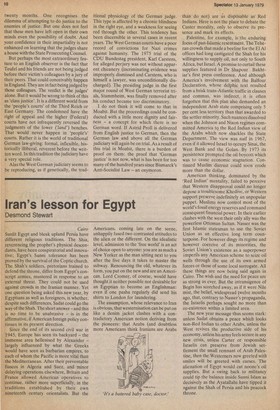Iran's lesson for Egypt
Desmond Stewart
Cairo Sunlit Egypt and bleak upland Persia have different religious traditions. The Shia, reverencing the prophet's physical descendants, have been conspiratorial and innovative; Egypt's Sunni tolerance has been proved by the survival of the Coptic church. The Shah's soldiers, pretorians trained to defend the throne, differ from Egypt's conscript armies, mustered in response to an external threat. They could not be used against crowds in the Iranian manner. Yet one question being asked this new year, by Egyptians as well as foreigners, is whether, despite such differences, Sadat could go the way of the Shah. The short answer — and this is no time to be unabrasive — is in the affirmative, if American foreign policy continues in its present direction.
Since the end of its second civil war in 1945, Europe has seen its backyard — the immense area hellenised by Alexander — largely influenced by what the Greeks would have seen as barbarian empires, to each of whom the Pacific is more vital than the Mediterranean. After their preventable fiascos in Algeria and Suez, and minor delaying operations elsewhere, Britain and France allowed American operatives to continue, rather more superficially, in the traditions established by their own nineteenth century orientalists. But the Americans, coming late on the scene, unhappily fused two contrasted attitudes to the alien or the different. On the idealistic level, admission to the 'free world' is an act of choice open to anyone: you are as much a New Yorker as the man sitting next to you after the five days it takes to master the subway. Renouncing the old, whatever its form, you put on the new and are an American. Lord Cromer, of course, would have thought it neither possible nor desirable for an Egyptian to become an Englishman: even if one pasha regularly did send his shirts to London for laundering.
The assumption, whose relevance to Iran is obvious, that westernisation can be put on like a denim jacket clashes with a contradictory American notion deriving from the pioneers: that Arabs (and doubtless more Americans think Iranians are Arabs than do not) are as disposable as Red Indians. Here is not the place to debate the Custer morality, only to observe its presence and mark its effects.
Palestine, for example, is the enduring focus of pan-Islamic resentment. The Teheran crowds that made a beeline for the El Al offices had long castigated the Shah for his willingness to supply oil, not only to South Africa, but Israel. A promise to curtail these supplies featured in Dr Shapour Bakhtiar's first press conference. And although America's involvement with the Balfour Declaration, whose delphic text resulted from a brisk trans-Atlantic traffic in clauses and commas, was indirect, it is often forgotten that this plan also demanded an independent Arab state comprising only 5 per cent less territory than that awarded to the settler minority. Such nuances dissolved when the Johnson and Nixon regimes committed America tq the Red Indian view of the Arabs which now shackles the State Department. The view was naif in 1967, even if it allowed Israel to occupy Sinai, the West Bank and the Golan. By 1973 its persistence prompted the oil boycott which was to cause economic stagnation. Continued Muslim distrust could soon erode more than the dollar.
American thinking, dominated by the 'Red Indian' mentality, failed to perceive that Western disapproval could no longer depose a troublesome Khedive, or Western support preserve indefinitely an unpopular puppet. Muslims now control most of the world's fossil energy reserves and command consequent financial power. In their earlier clashes with the west their only ally was the powerless Ottoman Sultan. Nasser was the first Islamic statesman to use the Soviet Union as an effective long term counterpoise. For however dingy its regime and however coercive of its minorities, the Soviet Union's existence as a superpower imperils any American scheme to seize oil wells through the use of its own armed forces or those of some local surrogate. All these things are now being said again in Cairo. The wish and the need for peace are as strong as ever. But the intransigence of Begin has scorched away, as if it were Nile mist, the belief, widespread twelve months ago, that, contrary to Nasser's propaganda, the Israelis perhaps sought no more than co-existence within a limited area.
The new year message thus seems stark: unless Sadat obtains a peace which looks non-Red Indian to other Arabs, unless the West revives the productive side of his economy, unless his army feels secure in any new crisis, unless Carter or responsible Israelis can preserve from Jewish settlement the small remnant of Arab Pales tine, then the Westerners now greeted with smiles will be greeted with curses. The alienation of Egypt would cut noone's oil supplies. But a swing back to militancy could tip the balance inside Sunni Islam as decisively as the Ayatallahs have tipped it against the Shah of Persia and his peacock throne.


































 Previous page
Previous page